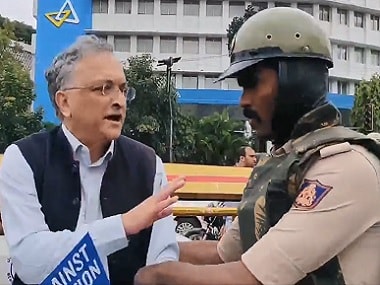On Wednesday, the government announced prohibitory orders in Bengaluru and several districts of Karnataka under Section 144 of the Code of Criminal Procedure. These orders were to kick in at 6 am on Thursday and last till Saturday midnight. Nevertheless, citizens of Bengaluru, like their compatriots in many other cities, held a peaceful protest march against the Citizenship (Amendment) Act, 2019 (CAA). The protesters, including historian, sociologist, writer and columnist Ramachandra Guha, were detained. An outcry has broken out worldwide against this action of the Bangalore Police. [caption id=“attachment_7803791” align=“alignleft” width=“380”]
 Ramachandra Guha being detained the Bangalore Police.[/caption] On a somewhat more enigmatic, if not outright bizarre, note, the administration imposed Section 144 on all of Uttar Pradesh, refused permission for protest rallies and meetings, and OP Singh, the director-general of police, sent out a tweet asking parents to counsel their children. ‘Section 144 is in force and no permission for any gathering has been given for 19 December. Please do not participate. Parents are also requested to counsel their children,’ the tweet said. So, where exactly are we? A respected liberal academic and scores of citizens are detained for protesting a law that is not only patently discriminatory against Muslims and, very possibly unconstitutional. The authorities clamp prohibitory orders on the most populous state in India. Doubtless many of the over 2oo million people in the state will be inconvenienced. More than five people do assemble, after all, for purposes other than protest or the perpetration of mayhem. But inconvenience is a minor thing in this context. The Uttar Pradesh and Bangalore Police have abridged the right of citizens to peaceful protest. That the peaceful protest, in this case, happens to be against an Act of Parliament that is widely seen as being injurious to the nation and its people in manifold ways, makes this abridgement all the more grievous.This signifies that the authorities are not prepared to tolerate any form of dissent, even from a person whom the Indian State had honoured with the Padma Bhushan award in 2009. On the positive side, India must consider itself blessed that such blanket orders have not been imposed in most of the country. It could be argued that the Uttar Pradesh and Karnataka governments feared violence. This cannot, obviously, be a justification for banning peaceful assembly and protest. It is up to the police to put in place systems to ensure that those inclined to delinquent behaviour are not allowed to run amok. Other states are doing precisely that: Dealing with situations on merit. And what are we to make of the tweet from the Uttar Pradesh director-general of police. What on earth does the last sentence mean? Parents are requested to tell their children that they must slavishly bow and scrape to authority; and that they should not develop a sense of right and wrong, or the moral courage to confront, decry and protest what they think is wrong. Is the Uttar Pradesh police’s model citizen a man, woman, girl or boy who will run away from the debates, often acrimonious, that shape and continuously transform the nation? In other words, does the Uttar Pradesh police want a body of automatons to govern over, or a citizenry?
India is in a precarious position today. It is caught in a pincer movement. From one side, efforts to blot out the secular and embracing character of the republic is being sought to be erased. The CAA is not a step, but a lunge in that direction.
Advertisement
End of Article


)

)
)
)
)
)
)
)
)



